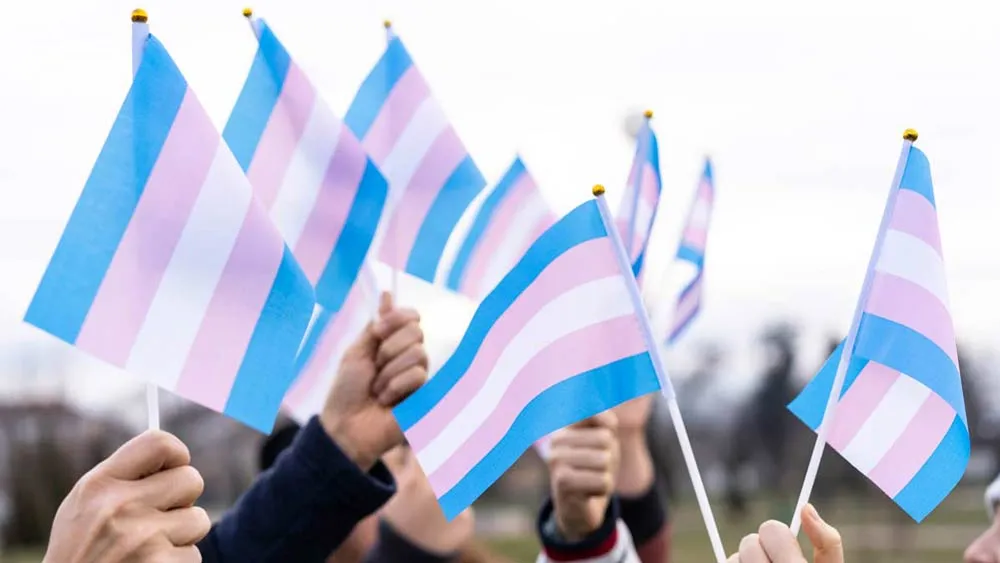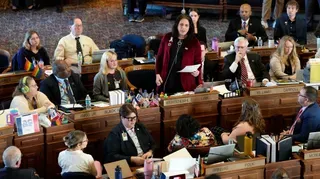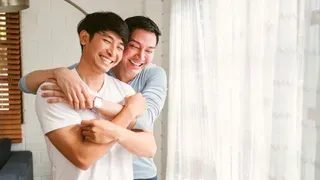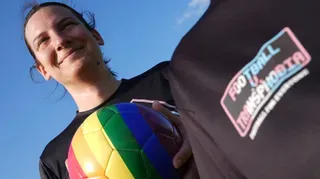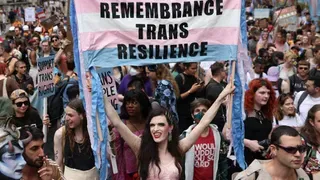April 4, 2011
More Families Adopting HIV-Positive Children
Kilian Melloy READ TIME: 7 MIN.
The immediate task might be coaxing a toddler into one more swallow of nasty-tasting medication. Longer term, there are tough choices to be made about telling that child - and the surrounding community - why those daily doses may be needed for the rest of his or her life.
While most adoptions present challenges, there's a distinctive set of them facing parents who decide to adopt children living with HIV. A twice-daily medication regimen, lingering prejudice and fear, uncertainty about the child's longevity and marriage prospects.
Yet the number of U.S. parents undertaking HIV adoptions, or seriously considering them, is surging - from a trickle five years ago to at least several hundred. Most involve orphans from foreign countries where they faced stigma, neglect and the risk of early death.
"I can't think of a more significant way to make an impact than to do this," said Margaret Fleming, a 74-year-old Chicagoan whose nine adopted children include three HIV-positive first graders.
"These kids were, in many ways, the modern-day lepers," she said.
Ignorance and bias related to HIV haven't vanished in the United States. But the stigma is steadily lessening, especially compared to many of the other countries that are home to an estimated 2.5 million children with the disease.
At forums and over the Internet, parents who have adopted HIV-positive kids are offering advice and encouragement to those who might follow suit. In February, Bethany Christian Services - the largest U.S. adoption agency - unveiled a detailed educational package about HIV adoptions to help the growing number of interested parents make informed decisions.
"We didn't feel we could ethically place these kids without some really solid education for these families," said Sara Ruiter, Bethany's international services coordinator. "There are some very unique, chronic challenges that we want to be on the parents' mind."
One of the most difficult challenges, for many families, is deciding whom they will tell about the adoptive child's HIV status. Health care providers must be informed - otherwise, under federal and state confidentiality laws, it's entirely optional whether parents notify school officials, neighbors, or anyone else.
As a result, families' approaches vary widely - some are totally open while others, fearful of stigma, guard the information so tightly that even the child may be kept in the dark for many years.
"Once your child's status is disclosed, you cannot `take it back,' so careful consideration and thought should be given to this important issue," Bethany advises.
For Tim and Annette Franklin, of Bridport, Vt., the decision to be open about their adopted daughter Gedeleine's HIV status was intended to make clear it's nothing to be ashamed of.
"We were concerned that by being overly secretive, we would be contributing to the stigma," said Tim Franklin, a Congregational minister.
"Inevitably, in families where there are secrets, the secrets end up being destructive," he said. "We felt it's going to come out, and we want to control the way it happens, rather than it coming out in a bad way."
Gedeleine, who will turn 4 in May, was living in a Haitian orphanage when the catastrophic earthquake struck there on Jan. 12, 2010. Already in the adoption pipeline, she was airlifted to Florida 11 days later with dozens of other children, then taken to her new home in rural Vermont.
There have been moments where Gedeleine balked at taking the twice-daily dose of three HIV medicines. But her parents, who have four biological children ranging in age from 8 to 19, say the adoption has been a heartwarming success overall, to the extent that they are now completing arrangements to adopt an HIV-positive boy from Ethiopia.
The arrival of 13-year-old Epherem will speed up the timetable for the Franklins to tackle one of the other distinct challenges of HIV adoptions - having frank discussions with the child about the impact of their status on any future sexual relationships, and the need to be honest with any partner.
"We'll have to find out what he knows about sexuality, what he knows about his disease, what values he's been exposed to," Tim Franklin said. "One of the things we'll try to help him understand is that he has a responsibility to other people."
Like the Franklins, Ryan and Stacy Vander Zwaag of Mears, Mich., have decided to be open about the HIV status of their newly adopted 2-year-old daughter, Luisa, who just arrived from Colombia on March 19. They even have a detailed section about HIV on the family blog.
"We did not have to tell anyone," the Vander Zwaags write. "But we believe God has given us this opportunity to educate others about the precious children like Luisa (and adults too) that are living with HIV and AIDS and help raise awareness and truth instead of ignorance and fear."
Luisa joins a household bustling with the Vander Zwaags' four biological sons, aged 5 to 13, and daughter Anaya, almost 4, who was adopted from Guatemala in 2008.
The boys were briefed in stages about their new baby sister -- first being told she had a blood disorder, then getting the full story that she had HIV. There were specific instructions about precautions to take if Luisa bled from an open cut, but the overall message was one of reassurance that the disease can't be spread through casual contact.
Ryan Vander Zwaag, the youth pastor at a Baptist church, said he and his wife had talked about adoption ever since they married right out of high school. The more they learned about the vast numbers of HIV-positive orphans, the more interested they became in bringing one into their family. Fears about exposing their own family to health risks and prejudice gradually faded as they read articles, attended a conference, and spoke with other parents who had undertaken HIV adoptions.
"It's not that hard," said Stacy Vander Zwaag. "And there are so many kids who would die without it."
Luisa was in that category, her parents said. A doctor told them she would almost certainly have died soon had she stayed in the Colombian foster home where she was placed as an infant.
"She was removed from her parents because of medical neglect," Ryan Vander Zwaag said. "It was nothing she did. It was choices her mother and father made that got her infected with HIV."
The Vander Zwaags have been homeschooling their four sons, but they hope to place Anaya and Luisa in a nearby Spanish immersion school so the girls can be fluent in the language of their homelands.
So far, they say, friends, neighbors and church members have been overwhelmingly supportive of the news about Luisa, but they know complications might await in the future.
"As she goes through her teens and her dating years, there are going to be questions, and a lot of tears over it," her father said. "She'll have to find that right guy to walk with her through life. That will be challenging. She can live a full life, she can have kids, by being careful, taking the medicine."
There are no firm figures on the number of HIV-positive adoptions in the U.S., though adoption experts say most involve children from abroad because American mothers with HIV are usually able to avoid transmitting the disease to their babies by taking medication during pregnancy.
Throughout most of the AIDS epidemic, only a relative handful of HIV-positive foreign children came to the U.S. because of strict U.S. immigration policies that limited entry for anyone with the disease.
In January 2010, that restriction ended - enabling children with HIV to enter as easily as other adoptive children.
"That change helped drastically," said Erin Henderson of Afton, Wyo., who is HIV coordinator for Adoption Advocates. The agency handled 37 adoptions of HIV-positive Ethiopian children in 2010, up from four in 2006, and is also working on HIV adoptions from India, Ghana, Thailand, China and Eastern Europe.
Henderson's current job grew out of personal experience - she and her husband have three biological children and eight adopted children, including an HIV-positive daughter and son from Ethiopia.
"Our plan initially was to keep that private - just share it with family members," Henderson said. "But we decided we would have to be open ... I hated the way it felt to tell our other kids to lie."
When they first heard they were getting HIV-positive siblings, the other children were all 11 or younger - and Henderson said they all took the news cheerfully in stride.
"If they'd been older, it might have been more of an issue," she said. "They didn't know much about it, and we were very matter-of-fact."
There's no consensus that early and full disclosure is best.
Dr. Jane Aronson, a New York city pediatrician who specializes in the care of children adopted from abroad, argues that HIV-positive children have a right to keep their status private until they're old enough to have a say regarding who is informed.
"Some parents have made a decision to define their children's identity now - it's more about them than about the kids," Aronson said. "That could be very challenging when the children grow up. They didn't have a choice."
Margaret Fleming, the Chicago woman with three adopted, HIV-positive children, runs a support service called Chances by Choice that recruits and advises parents interested in HIV adoptions. While the group's official advice is that disclosure "is totally at the discretion of the parents," Fleming personally opted for openness.
Her three first-graders "already know they're HIV-positive," she said. "I am completely open with them, our neighbors, their schools."
At the local elementary school, teachers and staff responded supportively, Fleming said, with the principal easing the concerns of one parent who called to complain.
At a summer camp, however, the director was angry when he learned after-the-fact that one of the HIV-positive children was attending, even though Fleming had mentioned that on the application form.
From a very early age, Fleming's three children with HIV learned they had a chronic health problem that required taking unpleasant-tasting medicine. Initially, she told them their blood "is not strong" - now they, as well as their siblings, know the problem is HIV, and the older ones help administer the medicine when Fleming isn't home.
"They are great ambassadors," Fleming said of her three HIV-positive children. "They've dispelled a lot of myths."
Chief among the myths, she said, are misconceptions on how HIV is transmitted and fears that HIV-positive children risk not reaching adulthood.
"My own children look terrific," Fleming said. "They can live long, happy lives."
Kilian Melloy serves as EDGE Media Network's Associate Arts Editor and Staff Contributor. His professional memberships include the National Lesbian & Gay Journalists Association, the Boston Online Film Critics Association, The Gay and Lesbian Entertainment Critics Association, and the Boston Theater Critics Association's Elliot Norton Awards Committee.
